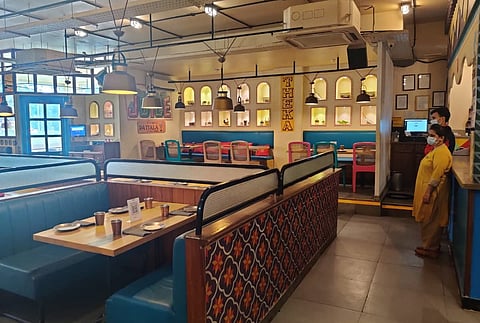

On Tuesday, a warm afternoon, I stepped into the streets of Indiranagar and noticed that there was noticeably less bustle. That much was expected, given the pandemic has meant that many offices in the area have either enforced work from home, or are running at a reduced capacity. A fallout of this has been that the eateries and restaurants that would have been brimming with people during lunch time wear a desolate and empty look in this once lively locality.
A branch of Empire restaurant on 80-feet road in Bengaluru has a makeshift booth outside where a man sits. The booth says ‘contactless dining’. Inside, Uwaiz, who manages the reception desk, explains that one can reserve tables there and for those who walk in, the booth serves as a place to check temperature and sanitise their hands.
“We also note down the number of the people who come in, and have made the seating more spread out and spacious,” he says. Upstairs, where the seating is, just three tables are occupied. “We only get around 10 tables during lunch on weekdays. Earlier it would be around 15-20 tables’ business.”
At Dhaba, a restaurant on 12th Main in Indiranagar, the staff gets up eagerly as I walk in, thinking I am the first customer. Outside the main door, there is a sanitiser station and temperature check machine, as well as a podium with a register where they take down names and phone numbers of the customers that they get – just in case one of them tests positive for the novel coronavirus, and they have to inform the other customers who were there.
Starlet, who has been working at Dhaba, reveals that business has been quite low. “We would earlier get many corporate clients and kitty parties during the lunch hour. But now, on weekdays, we have around five tables’ business in total, and on weekends, 10-15.”
While the seating doesn’t appear to be rearranged, Starlet points out that they ensure that every alternate table is left empty to maintain physical distancing. “But we do have Swiggy and Zomato delivery orders coming in. To boost business, we have also started doing self-deliveries to nearby areas using Dunzo where we bear the delivery expense,” she adds.
When it comes to lower end restaurants like Madurai Idly Shop on 80-feet road, the story is similar. Saifudeen, who used to work at the recently shut down Andal Mess, had to take up a job at Madurai Idly Shop. Here too, like at Dhaba and Empire, there is a sanitiser station at the entrance at the desk where one can place orders. These places also had a contactless menu ordering system, where one can scan from the QR codes placed at the entrance, or online.
“We haven’t really changed the seating much because the footfall is quite low. Even downstairs, where it is self service and there are tables to stand and eat, not more than one or two people stand together at a time. Today, so far just 10 people have come in,” Saifudeen tells TNM, at around 3.20 pm.
There is also only one temperature check machine so far, which has recently been moved upstairs, where there is seated dining, unlike the self-service model on the ground floor. “We are also taking the details of the customers like phone numbers. The footfall is low because people are barely coming to office. In these buildings opposite us, there were around 200 people who worked who would come for meals. That is no longer the case,” Saifudeen adds.
At Moti’s Kitchen in Thippasandra, a small place which serves Kerala food, the lower floor where Albert sits at the reception, has been closed down for seated dining. Upstairs, he says, they have not changed the seating to make it more spacious because they barely have customers. On Tuesday afternoon, just two tables were occupied. “We have also removed the menus, and the waiters just tell the items verbally to customers,” Albert says.
Interestingly, the place which, by comparison, had the most number of tables occupied, was a Café Coffee Day branch. At around 3 pm, there were people sitting at five of the tables when this reporter went there. While the ordering process has been moved online and via phone, the manager says that their business is at only about 40%.
“A lot of people in real estate and IT who used to come in earlier have now reduced. We hardly see any families, and no birthday parties either. Though we are sanitising the tables and chairs after each party of customers leaves, there are just not enough people coming in as before,” he says.